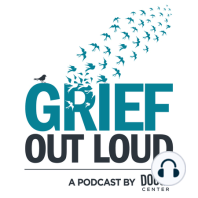11 min listen
Ep. 8: Living In Dying, Dying In Living: Grieving Before Death
FromGrief Out Loud
ratings:
Length:
35 minutes
Released:
Mar 5, 2015
Format:
Podcast episode
Description
Living with an advanced serious illness All in all, even under the best circumstances where families have substantial financial resources and savings, great medical and life insurances, medical knowledge, access to great health care and multiple caregivers, an articulated living will or end of life directives, and emotional/spiritual support, it will be an extremely challenging and life altering experience. Challenges and complexities This is not an all inclusive list, but meant to highlight only a few of the challenges: High Anxiety: Research has shown that children with an immediate family member who is dying have extremely high levels of anxiety and for good reason, death is ever present; Anxiety can be manifested in many forms; restlessness, “acting out,” anger, irritability, stomach aches, nausea, in-attention, “on edge,” emotional distancing or clinginess to name a few. High Stress: Family members may respond to the stress with big energy and little energy or varying between the two extremes. They will also be trying to cope with the stress in various ways, sometimes those ways will conflict with each other. Exhaustion: There is usually complete emotional, physical, mental, social, and spiritual exhaustion. Role Conflicts: The demands of the illness almost always creates role conflicts for each family member whether that is between the role as a spouse or the role of a parent, spouse or caregiver, son/daughter pr caregiver, employee or family member; teen/kid or child. This is one of the greatest contributors of stress. Financial Setbacks: Loss of income and increased medical expenses & secondary care expenses usually confront most families. Relationship Issues: Life with an illness usually demands drastic changes in where one can spend time and invest energy. Maneuvering through social, professional, and familial relationship can be a challenge, even in a supportive environment. Ethical Dilemmas: Most families will be confronted to make decisions that they never thought they would have to make or having to decide between options that are not favorable or agreeable. There may be differences of opinion within the immediate family. In addition, many others will offer unsolicited advice when those dilemmas arise. So what can a family do? Keep open, honest, and clear communication in all directions. This includes between adults but also between adult caregivers and children. Most often adults refrain from sharing the truth with children because of our own fears rather than because of their lack of ability to handle the truth. As long as we are sincere, open to answering questions, repeatedly at times, and keep it to their age level, the long-term benefits of sharing the truth far outweigh the immediate benefits of concealing information or misrepresenting the truth. Never lie to a child. Communicate often. Share what you know as you know it, even if that means you need to share that you don’t know anything. You build trust with children when you communicate often about what it is going on and what you do know. Give children tasks and responsibilities to reduce feelings of helplessness. No one likes to feel helpless, even kids. Soliciting their help and offering choices to help care for the person with the illness can help foster a sense of empowerment. Provide structure and routine. Children and adults both need routine, especially in the midst of the chaos that so often ensues around medical issues. Provide as much structure as you can. Leave room to be a kid/teen. The person who is dying is important, but they are one aspect of the child’s and/or teen’s life. Children need opportunities to play, have fun, be loud, and enjoy the company of other children. Teens also need opportunities for independence and socializing with other teens. Role model being ok with not knowing. There will be a lot of unknowns. Children need to see that it
Released:
Mar 5, 2015
Format:
Podcast episode
Titles in the series (100)
Dear Dougy: Introductions: In this inaugural episode of the Grief Out Loud Podcast, Jana and Brendon introduce themselves, talk about the history of The Dougy Center, and our work with grieving children and their families. Jana and Brendon also do a little housekeeping... by Grief Out Loud
